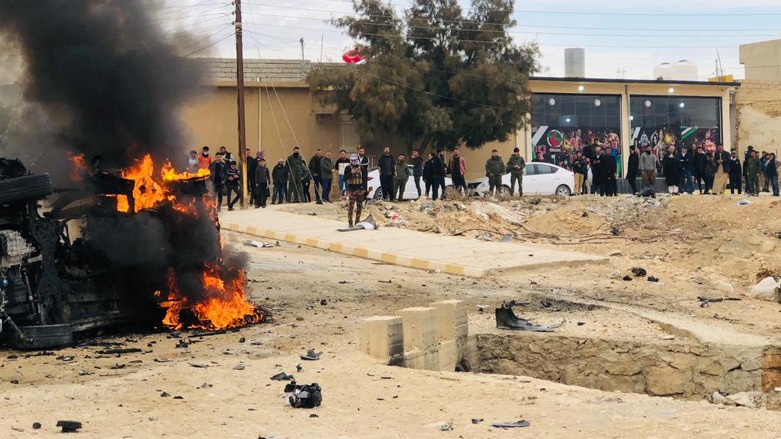Alleged Turkish strike kills Yezidi militia commander in Iraq’s disputed Sinjar

ERBIL (Kurdistan 24) – An alleged Turkish strike on Tuesday in Iraq’s disputed district of SInjar (Shingal) killed a local commander of the Yezidi (Ezidi) Protection Units (YBS) group, made up of members of the beleaguered religious minority.
At the time of reporting, it was still unclear whether the strike was carried out by the Turkish military’s warplanes or its drones.
“We condemn the Turkish bombing in Khanesor town today, which targeted Marwan Badal, commander of YBS, who was killed in the bombing,” Murad Ismael, co-founder of the Yezidi-focused human rights organization Yazda and also President of the Sinjar Academy, told Kurdistan 24.
“We also condemn the silence of the Iraqi government and the international community in the face of the repeated and illegal Turkish strikes.”
“If there is a security problem in Sinjar,” he continued, “the Iraqi government must find solutions to it, but it has miserably failed in resolving the security and administration issues in an acceptable arrangement as part of the Sinjar Agreement,” referring to a still-unimplemented deal signed over a year ago by Erbil and Baghdad to bring security and administrative order to the district.
Read More: KRG and Baghdad reach administrative, security agreement on Sinjar
The federal government and the autonomous Kurdistan Region announced in October 2020 that they had reached common ground with Baghdad officials to restore security and administrative order in Sinjar, where various competing armed groups remain active.
The YBS consists of members of the Yezidi religious minority group and is seen as close associates of the Kurdistan Workers’ Party (PKK), a group that has led a decades-long insurgency against Ankara for Kurdish rights in Turkey.
In September, Turkish airstrikes also targeted a YBS checkpoint.
In mid-August, Turkey carried out airstrikes for two days in a row in which civilians and YBS members were killed.
The 2014 ascendance of ISIS and its subsequent violent assault on Sinjar (Shingal) led to the displacement of hundreds of thousands of Yezidis. Most of them fled to the autonomous Kurdistan Region, while others resettled to neighboring countries in the region or to Western states.
Others were not as lucky and remained stranded in the warzone, where they were subjected to atrocities and mass executions at the hands of the extremist group for years. ISIS militants forced women and girls into sexual slavery; kidnapped their children; forced religious conversions; executed scores of men; and abused, sold, and trafficked women and girls across the areas they controlled in Iraq and Syria.
Yezidi organizations including Yazda roundly welcomed a German court ruling yesterday that convicted Iraqi ISIS militant Taha al-Jumailly on charges of genocide against members of the Yezidis (Ezidi) religious minority starting in 2014.
Read More: Yezidi activists praise German conviction of ISIS member for genocide, stressing legal significance
This is first verdict worldwide to specifically use the label "genocide," an important legal distinction. In the past, ISIS members have been sentenced to jail on the basis of individual crimes against Yezidis, but not genocide.